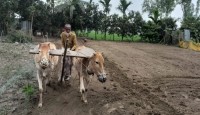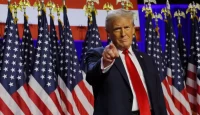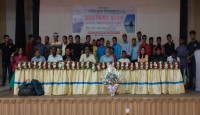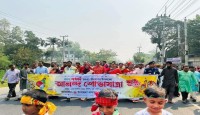Is Bangladesh Racing to Return to a Dark Age?
Dr. Pamelia Riviere
Has Bangladesh truly experienced a revolution concerning the recent name changes at Khulna University? Indeed, there has been a profound transformation. The buildings at Khulna University, once named after esteemed figures such as Satyendranath Bose, a notable physicist; Jagadish Chandra Bose, a pioneering scientist in plant science and radio technology; Prafulla Chandra Roy, a distinguished chemist; Jibanananda Das, a revered poet; Lalon Shah, a legendary Baul saint and musician; Tajuddin Ahmad, a prominent political figure; Jyotirmoy Guhathakurta, a notable academic; and Alim Chowdhury, an influential artist, have all undergone simultaneous renaming. This change coincides with alarming cultural restrictions and threats to artistic expression. The drama festival in Dhaka was abruptly closed due to alarming threats of violence from fundamentalist groups, highlighting an ongoing climate of fear.
The evidence supporting this troubling situation is multifaceted: 1. The annual Lalan Smarnotsav, a key cultural event honoring the legacy of Lalon Shah, faced dismissal due to conflicts regarding custody and safety. 2. A critical three-day theater festival, featuring performances from 85 theater groups, was completely canceled in light of explicit threats aimed at participants. 3. The Vasantavaran ceremony, which celebrates the arrival of spring, was also called off due to various coercive obstacles. 4. A kite festival, a traditional celebration, was shut down after threats emerged, showcasing a broader attack on cultural practices. 5. The renaming of student halls to honor world-famous scientists—many of whom are non-Muslim—suggests a systematic effort to erase secular legacies.
6. Approximately 85 shrines significant to the spiritual heritage of Bangladesh have been deliberately destroyed. 7. Acts of vandalism targeted flower shops on Valentine's Day, signaling an intolerance towards expressions of love and cultural appreciation. 8. Baul music, emblematic of the region's rich musical heritage, faced severe restrictions, with police seizing instruments from performers. 9. There were outright bans on music in public spaces, such as North Bakharnagar Bazaar, undermining the cultural fabric of the community. 10. Fairs and community events have faced cancellations, girls' football games have been suspended, and numerous shrines desecrated, reflecting a pattern of disruption. 11. Some actresses have been denied the right to open businesses, an infringement on their civil rights and a chilling signal of gender discrimination in the arts.
These developments collectively indicate a disheartening trend of cultural suppression, threatening the diverse forms of artistic expression that characterize Bangladeshi society. In this complex sociopolitical landscape, reform and tyranny often intersect, raising questions about the nature of governance. Many observers argue that a form of "benevolent autocracy" may be one of the few paths for a political figure to sustain long-term authority in such a volatile environment. Historical precedents show that regimes that resort to overtly tyrannical measures frequently face a rapid decline in both authority and public legitimacy. While reform is a crucial element of effective governance, the imposition of rigid religious ideologies can lead to severe repercussions. The emergence of a markedly conservative atmosphere, particularly evident through groups like the Boishommo Birodhi student organization, has raised alarms.
Their rhetoric reflects a departure from the secular principles that once defined the nation, provoking concerns about the potential for heightened societal polarization. Moreover, the progressive developments that occurred during the former Prime Minister's tenure appear minimal when compared to the staggering amounts of wealth reportedly amassed through corrupt practices by members of the Awami League (AL) Party and their affiliates. Over fifteen years, accusations of embezzlement and graft have surfaced, casting a shadow over the party's integrity and leadership. Under this administration, the education sector has been fraught with challenges, most notably the problematic accreditation of Qoumi Madrassas.
This decision, which granted legitimacy to unregulated institutions, has significantly undermined the value of secular educational frameworks, indicating a broader deterioration of academic standards. Furthermore, the government has systematically dismantled democratic institutions, frequently employing oppressive measures against political opponents. This stifling of dissent jeopardizes the fundamental tenets of democracy—undermining the very fabric of political discourse and civil rights in Bangladesh. The repercussions of these actions continue to reverberate throughout the political landscape, challenging the nation's future and democratic aspirations.



.jpg)


.jpg)



.jpg)
